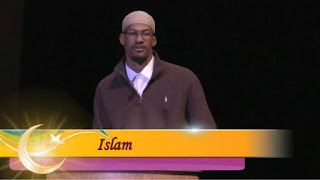Muslim Luminaries You Don’t Know…But Should
As a Muslim speaker and lecturer, I constantly engage in or
observe conversations that inevitably center around contributions of Muslims to
societies at large. As a weird hobby I flit through various social media forums
that have islamophobic leanings and invariably they are rife with criticisms of
Islam and Muslims that note the absence of any scientific or influential
contributions by Muslims – a claim supported by the notion that Muslims
world-wide are too busy with trying to convert or kill their non-Muslim
counterparts to be bothered with education or any interest in making the world
a better place.
It goes without saying (or does it?) that nothing could be
further from the truth.
There are innumerable Muslim scientists, thinkers,
artists, educators, and activists who are overlooked by the general perspective
of non-Muslims (and, sadly, Muslims) whose attention is drawn more to
sensationalism and controversy. The
criticism and fear-mongering aimed at Muslims is easier and more convenient
when Muslims can be portrayed as backward, Third-World inhabitants who trade
education for terroristic anger, who are all secretly envious of the deluge of
iPads and SUVs that floods the West.
In many talks, especially addressing islamophobia, I often
advise that Muslims need to take greater responsibility and make greater
efforts to share their own narratives, their (our) own stories, as a way to educate
others (read: “non-Muslims) about our faith and about the those of us worldwide
who comprise the community that adheres to it. One does not have to refer only
to bygone Golden Age of Islam to nostalgically cite scientist and philosophers
or tell stories about brewed coffee’s invention or the development of optics in
medieval laboratories - there are plenty
of contemporary personalities who have an continue to exemplify the
progressive, scientific, and intellectual nature of Islam (because, after all,
Muslims are people – many who are progressive, scientific , and intellectual),
and who are busy trying to make life easier, convenient, relevant…and better.
So, what follows is my personal and incomplete list of
contemporary Muslims, across various disciplines/perspectives/segments of
society that are notable, should be shared – and even celebrated:
Maryam Mirzakhani – (b. 1977) An Iranian mathematician and
professor, Maryam is simply a genius. While a teenager, she placed 1st
at the International Mathematics Olympiad, getting a gold medal for a perfect
score. She gold medaled the year prior, dropping only one point. In 2009,
Maryam received the Blumenthal award for her doctoral thesis which covered
diverse math topics such as hyperbolic and algebraic geometry. She was a
professor at Princeton and is currently a full professor at Stanford
University.
Umar Saif – Umar is a computer scientist (read: “super-duper
geek”) and award winning innovator who invented technologies such as BitMate to
help low-bandwidth users in developing countries. His innovations helped civil
activist communicate and relief efforts during disasters such as Pakistan
floods in 2010.
Muqtedar Khan – India born Muqtedar resides in Delaware and
is a leading educator, social scientist and intellectual, known for criticism
of radicalism and extremist perspectives within Islam. A frequent commentator
in the media, Khan is a proponent of critical thought and balancing classic
Islamic scholarship with contemporary American societal issues/politics.
Kerim Kerimov – (d 2003) Kerimov, a Muslim from Azerbaijan,
was one of the founders of the Soviet space program. He was the secret general
of the program in its race against the US to walk the moon – his identity
purposely kept hidden until 1987. While his tenure saw several tragedies and
ultimately a loss in the space race to the US, Kerimov contributed to the
development of the successful Mir space station.
Sheikh Muszaphar Shukor (b 1972) – Shukor is the first
Malaysian (and the 9th Muslim) in space, visiting the
International Space Station in 2007. In
space Shukor performed experiments involving cancer cells and lipase protein
synthesis. His space flight had great religious impact in that it occurred during
Ramadan, thus motivating the development of a guidebook for Islamic practice in
space, including ritual prayers and fasting.
Muhammad Yunus – (b. 1940) –Yunus, voted as the #2 most
intellectual person in the world by Prospect Magazine (UK) in 2008 is also the
2006 Nobel Peace Prize winner for his pioneering work in economics. Inspired by
the amazing effects of giving a $27 loan to a group of bamboo workers in his
native Bangladesh, he founded a pilot program to provide micro loans to poor
workers. The program grew to bank and supporting financial services and
businesses that uplifted countless out of poverty, proving to be an amazingly
successful model that Yunus was able to repeat internationally .
Suhaib Webb – (b 1972) – Webb, born in Oklahoma, grew up as
a typical trouble-making teenager, flirting with gangs and eventually settling
into being a hip hop DJ. He converted to Islam at the age of 20 and after
college and classical Islamic tutoring, he attended and graduated from Egypt’s
Al Azhar University. With a keen grasp
of American culture and of Islam, Webb is a sought after leader and lecturer, now
based in Boston
Now, Dear Reader – time to do some homework – take a look
into a couple more notable Muslims for yourself:
- Ingrid Mattson – advocate and first woman president of major Islamic organization
- Jerald Dirks – horse breeder, Harvard grad, comparative religion scholar
- Megawati Sukarnoputri – major Muslim politician and pioneer
- Andre Carson – major Muslim politician and pioneer




Comments